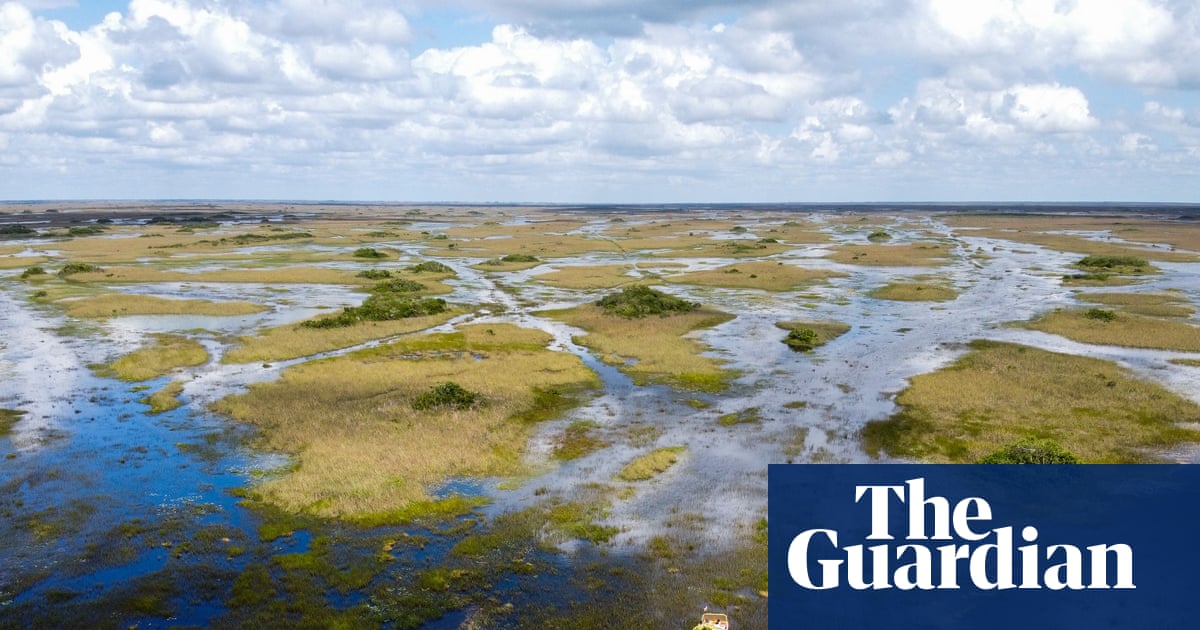An environmental scientist briefly jailed in what he called a “political prosecution” brought by allies of Florida’s rightwing Republican governor, Ron DeSantis, now alleges new evidence shows his jail sentence stemmed from fraudulent allegations.
Tom Van Lent’s claim represents the latest twist in a three-year legal saga ignited by a disagreement over a proposed restoration project that aimed to address Florida’s recurrent red tides and toxic algal blooms by helping restore the environment of the vast Everglades wetlands.
Van Lent, widely seen as one of the top Everglades scientists in the US, is a former Everglades Foundation worker who posted a tweet seen as critical of the foundation. He and his attorney say the foundation – a large non-profit with friendly ties to state Republican leadership – then built a case against him on a claim that Van Lent had violated an employment contract.
Van Lent had publicly criticized the DeSantis-backed project when he left the foundation in 2022 by saying his new employer would “put facts over politics”. Soon after, the foundation sued, alleging Van Lent had violated the employment contract by keeping non-profit “trade secrets”. The case led to Van Lent being jailed for 10 days and facing $177,000 in legal costs in June when a judge found him in contempt of court for not returning some electronic material and documents.
But Van Lent’s attorney, Michael Rayboun, now alleges the employment contract does not exist, and accused the foundation of “fraud” because it claimed under oath that a contract was signed. Van Lent and Rayboun want the lawsuit reopened and the Everglades Foundation to be held accountable.
“The foundation has committed fraud by alleging the existence of a contract that does not exist,” Rayboun said.
The foundation denies the allegation and is opposing a motion to reopen the lawsuit, court documents show. “They want to chill his speech and chill others from saying how the foundation holds hands with Florida’s version of a dictator,” Rayboun said.
The foundation in a statement to the Guardian said an employee handbook that stipulated the terms was a legally binding contract. In a response filed with the court, the foundation called the motion to reopen the case “frivolous”.
“The foundation emphatically opposes the motion because there is no basis in fact or law to reopen this case,” it states. The foundation noted that the lawsuit was settled in 2022, and Van Lent agreed to the terms.
The case’s roots reach back to the early 2000s, when initial plans called for an approximately $4bn project to address the algal blooms that for decades had threatened the state’s drinking water and plagued its beaches with a deathly stench. The blooms have caused billions of dollars in damage to the region’s vast tourism economy, officials estimate.
The proposed solution called for a 60,000-acre water storage reservoir and engineered marshes to cleanse water that would be built south of the vast Lake Okeechobee in Florida’s interior. But the plan required the state to purchase or use eminent domain to take land owned by the nation’s largest sugar companies, which are politically connected and opposed any land sale.
In 2017, Florida Republican leadership presented a “compromise” that whittled down the project to 10,000 acres, which Van Lent and other scientists have argued would not be effective and would not meet federal rules.
Facing pressure from both sides, state leadership pushed the Everglades Foundation to accept the compromise plan, which DeSantis called the “crown jewel” of Everglades restorations.
Van Lent said his leaving tweet incensed the Everglades Foundation and its political allies.
The Everglades Foundation CEO, Eric Eikenberg, worked with DeSantis on the project while DeSantis was in the Florida legislature, then served on DeSantis’s 2018 transition team. He also served as chief of staff for the then governor, Charlie Crist. Meanwhile, the Everglades Foundation founder, Paul Tudor Jones, donated $250,000 to a 2018 DeSantis political action committee.
In 2022 alone, the non-profit spent $722,000 on legal fees, IRS records show.
“Their big legal effort has been to shut me down,” Van Lent said, adding that the level of spending revealed the non-profit’s priorities.
When the foundation sued in state court, alleging Van Lent waged “a secret campaign of theft and destruction” that involved destroying scientific documents and stealing “trade secrets” that were on his laptop.
In its 2022 lawsuit complaint, the foundation said Van Lent signed an employment contract, and a judge ultimately ordered him to turn over his electronic devices and email accounts. Van Lent said his work laptop also had personal documents, like tax information, and some items protected under attorney-client privilege. He destroyed or removed those, and the only files that the foundation alleged were missing were old, Van Lent has claimed.
Still, the Everglades Foundation alleged Van Lent kept some “trade secrets” and was deceptive about information that he had copied to a hard drive. The judge agreed, found Van Lent in contempt, and ordered him to jail for 10 days.
The jail sentence was not meant to remedy the lawsuit, but resulted from the contempt allegation that grew out of the suit.
Rayboun said he had asked for evidence of the employment contract before the contempt hearing, but it was never provided. He said he had confirmed the contract does not exist since Van Lent was released from jail.
The Everglades Foundation said in a statement to the Guardian that a policy manual signed by Van Lent that prohibits employees from keeping the non-profit’s materials was a binding contractual agreement. It said Van Lent had previously claimed in court that the manual was not a contract, but a judge rejected that claim.
Van Lent told the Guardian a judge had not ruled on whether the manual is a binding contract.
Meanwhile, the reservoir and marsh project is moving forward, and Van Lent said it was failing to meet water quality standards
“We were right along,” Van Lent said.

